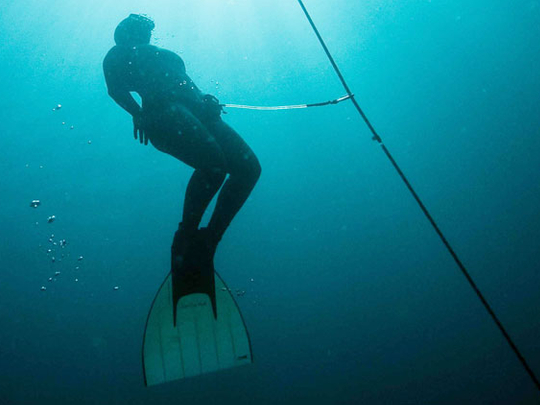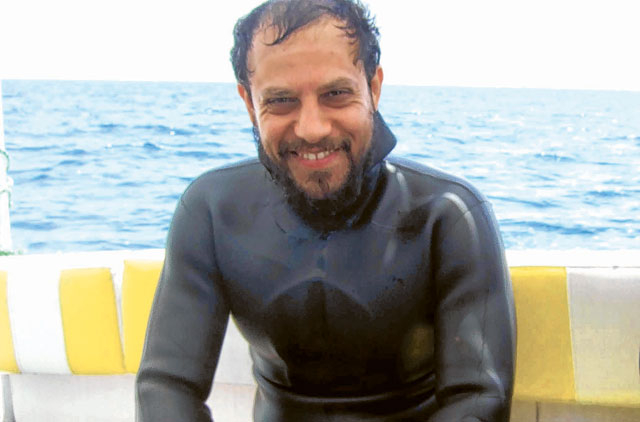
Dubai: Freedivers, keen to continue the sport in the UAE with hopes of holding international competitions in the Arabian Gulf, are planning to stop deep dives after the first professional Emirati diver was feared dead earlier this month during a 70-metre deep-dive attempt in Greece.
Breath-hold dives or apnea, known as freediving, involves reaching depths or travelling distances under water on just a lungful of air, without artificial breathing equipment.
"The 100-strong apnea community wants stricter measures applied to deep No-Limits freedives, which tarnishes the relaxing aspect of freediving and taints it as an extreme sport," said Sara-Lise Haith, 42, a freediving British instructor in the UAE.
During a No-Limits attempt, divers are dragged to a pre-defined target depth by means of a sled at a speed of around 2.5 metres per second. They come back up to the surface using a self-inflating balloon. Alternatively, in a Variable Weight dive, divers can choose to return to the surface using their own strength, with fins or by pulling themselves up a rope.
Pushing divers
"No-Limits is banned in competitions by the world federation for breath-hold diving, known as Aida [Association Internationale pour le Developpement de l'Apnee], but still open to record attempts, pushing divers to go deeper and deeper," said Haith.
"We teach people to freedive safely. But No-Limits is not freediving, it's a stunt," she said. "You should only dive to a depth you can swim up from."
Adel Abu Haliqa, 40, an Emirati from Abu Dhabi, did not resurface from a 70-metre No-Limits attempt in Greece on June 7, and is feared dead after search and rescue operations failed to recover his body.
Ratification
According to Haith, the continued ratification and recognition of No-Limits is severely hindering the development of more important sporting disciplines.
"Adel was a hero. He was much respected. I believe his death was unnecessary and could have been avoided," she said.
Marco Rettig, 36, a Dubai-based freediver from Germany, said he was very sceptical of sled-diving. "It puts you in utter dependency on a technology that, in the past, has more than once failed due to technical or human error or simply bad luck. Second, it allows you to overcome limits that your body and mind would otherwise not allow you to break," he said.
The idea to build a sled here was shelved based on the underwater conditions in the UAE such as currents and bad visibility.
Things can go wrong
"I can mention half a dozen things that can go wrong due the conditions here," Rettig added.
Secondly only a few people in the UAE would be capable of accompanying students on a sled on their way down.
"Going down on your own or being led by an instructor is a totally different thing — both mentally and with regard to safety," he said.
Investigation is still on — Aida president
Kimmo Lahtinen, president of Aida (Association Internationale pour le Developpement de l'Apnee), answers some questions on the recent freediving accident which involved a UAE national.
Adel Abu Haliqa, 40, from Abu Dhabi is feared dead during No-Limits training in Greece. Abu Haliqa, founder of Freediving UAE, worked hard to include the UAE as a member of Aida and hoped to conduct freediving competitions here in the future. The UAE was recently approved as an observer member.
Do you have a clear idea of what happened to Adel Abu Haliqa underwater?
Greece's coast guard has done their investigation on the accident already and Aida will do its own when the search is over. After this we may be able to estimate this accident better.
Was Adel prone to disconnecting from his safety lanyard? Is this an usual No-Limits behaviour?
Nowadays in deep No-Limits dives the lanyard is used. It will be attached above the sledge, connecting the diver to the dive rope where the sledge moves, and it should be kept there during the dive. This time it was not connected to the dive rope when the sledge came back to the surface. And we do not know the reason for that at the moment.
Who was his diving buddy?
Sled diving is often done alone.
What is the general procedure during such accidents?
Deep water searches are done normally with the help of the side-scan sonars and Remotely Operated Vehicles.
What training does Aida offer for No-Limits diving?
AidaA has sled diving safety guidelines and some divers use sledges regularly for deep training. Aida's sled diving safety guidelines can be found on the Aida website.
Should No-Limits be stopped?
There are no competitions in sled-assisted freediving in Aida. Some top freedivers have been setting records which have been validated by Aida.













